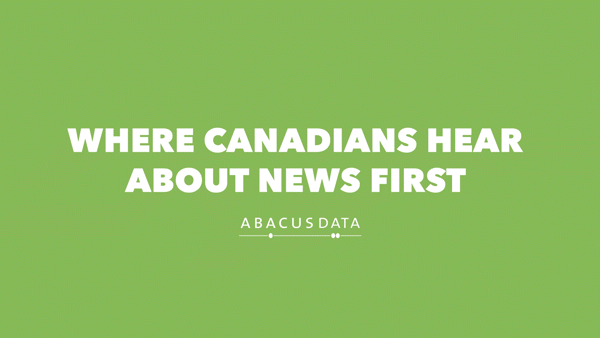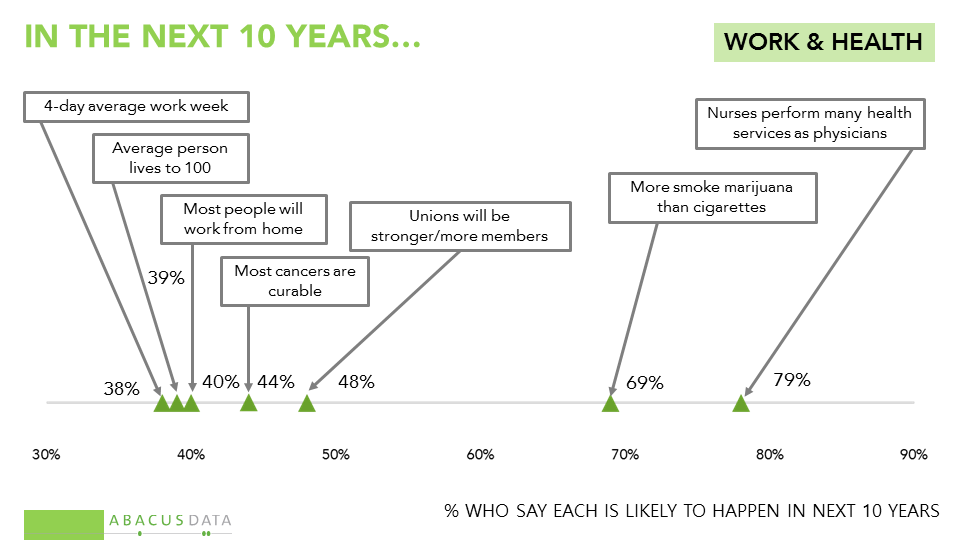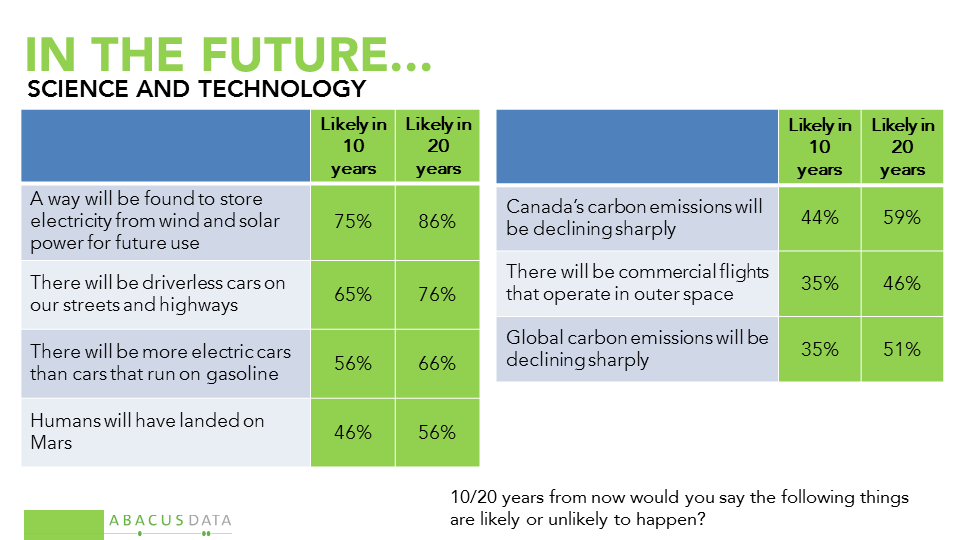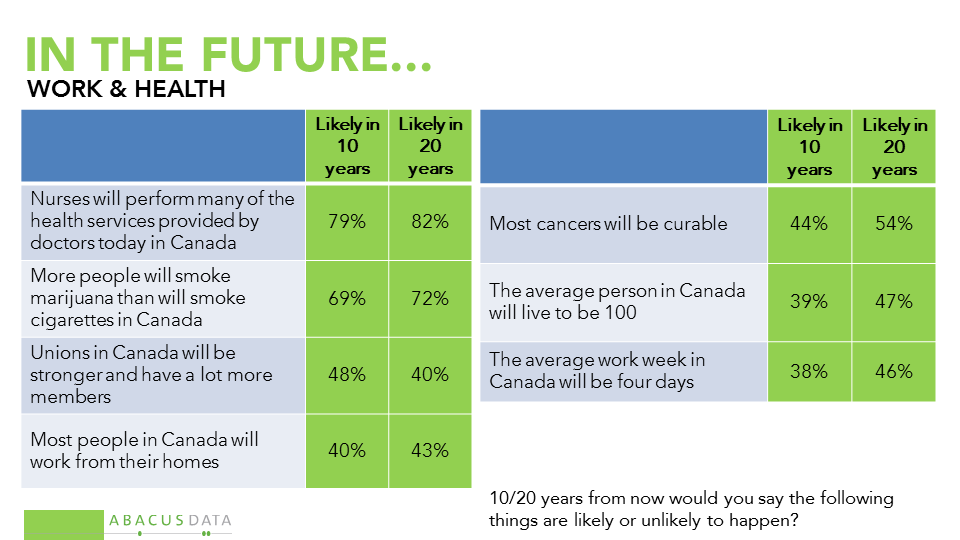Unpublished Opinions
Having conducted research for some of North America’s leading corporations and advocacy groups, we deliver global research capacities with the attention to detail and focus of a boutique firm. We have the capacity to conduct surveys, focus groups (on- and offline), membership surveys, elite and stakeholder consultations, and build online research communities. Our team combines the experience of our Chairman Bruce Anderson, one of Canada’s leading research executives for two decades, with the energy, creativity and research expertise of CEO David Coletto, PhD. We all value integrity, hard work, and creativity believing good research insights come from an intense focus on our clients, rigourous methods, and occasionally challenging convention. Whether it is a public opinion study on a challenging issue or consumer research on likelihood to recommend, our team has the experience and energy to deliver deep insights on-time, on-budget, and with creative perspective. - See more at: http://abacusdata.ca/about/#sthash.euNpekw1.dpuf
Public Opinion Poll: The Future as Canadians See it - Part II: Work, Health & Technology

By Bruce Anderson & David Coletto
ABACUS DATA
In our recent nationwide survey, we asked Canadians to tell us whether they thought a series of scenarios were likely or unlikely to transpire over the next 10 or 20 years.
Our first release can be found here.
Here are our findings on items related to science and technology:
• Most (75%) believe that in the next ten years a way will have been found to store energy from wind and solar for future use.
• Two thirds (65%) believe there will be driverless cars on our streets and highways.
• More than half (56%) think there will be more electric than gas powered cars.
• Almost half think humans will have landed on Mars (46%), and 35% think there will be commercial flights in space.
• Four in ten (44%) think Canada’s greenhouse gas emissions will be declining sharply, while 35% think global emissions will be declining sharply.
When it comes to the future of work and heath:
• 79% think it is likely that nurses will perform many of the health services performed by physicians in 10 years.
• 69% think that more people will smoke marijuana than cigarettes.
• Just under half (48%) believe unions will be stronger and have more members.
• 44% think most cancers will be curable and 39% believe the average Canadian will live to 100 years.
• 40% believe most people will work from home and 38% think the average work week will be 4 days long.
Comparing views across political lines, we find:
• Large majorities across all three major parties, believe energy storage solutions will be found for wind and solar.
• Liberals are more likely than others to think there will be more electric than gas cars on the roads in 10 years, the average work week will be 4 days long, most people will work from home, and more will smoke marijuana than tobacco.
• Liberals and New Democrats are more convinced that Canada’s GHG emissions will be declining sharply, compared to Conservatives.
• Liberal and NDP supporters are more likely to think that humans will land on Mars.

Comparing Outlook for 10 years and 20 years
Half our sample was asked the likelihood that certain events would occur in 10 years while the other was asked about a longer time horizon of 20 years. Some findings:
• Given a 20 year horizon rather than 10, Canadians were roughly 10 points more likely to think energy storage solutions would be found, there will be driverless cars on our streets, more electric than gas cars, humans would visit Mars, commercial flights would go into space, and most cancers would be curable.
• 59% thought Canada’s emissions would be declining sharply in 20 years compared with 44% who thought this was likely in 10.
• Adding 10 years to the horizon also made more people imagine the average lifespan would be 100.
• In contrast, there were more doubts about the future of unions, the longer the outlook.
THE UPSHOT
Bruce Anderson: “Canadians are known to be risk-averse, but these numbers suggest that they are not necessarily change-averse. Several of these findings suggest there is a fair bit of optimism about the potential for technology and imagination to change our world for the better: lengthening life spans, reducing environmental impacts, and expanding our understanding of space.
Correctly or not, many Canadians believe technology will be an important part of the solutions needed to reduce carbon emissions. Public expectations for the pace of emissions reduction may disappoint some, but there are few who foresee a future where Canada is not making real progress in this area, at least over the coming 20 years.”
David Coletto: “How will our lives change in 10 to 20 years? Canadians can imagine a world that is healthier and powered by renewable energy and new technologies that today are being developed. Many of us can see streets filled with driverless, electric cars powered by energy generated by the sun and wind. We see nurses peforming many of the same health services as physicians while most of us live into our 90s and 100s.
These findings suggest that since many Canadians expect rapid changes in technology, energy, and health, our ability to adapt and cope with those changes will be easier and less surprising. The speed at which things have changed in the past 20 years has primed us to expect even fast change in the next 20.”
METHODOLOGY
Our survey was conducted online with 1,500 Canadians aged 18 and over from June 14 to 16, 2016. A random sample of panelists was invited to complete the survey from a large representative panel of over 500,000 Canadians.
The Marketing Research and Intelligence Association policy limits statements about margins of sampling error for most online surveys. The margin of error for a comparable probability-based random sample of 1,500 is +/- 2.6%, 19 times out of 20.
The data were weighted according to census data to ensure that the sample matched Canada’s population according to age, gender, educational attainment, and region. Totals may not add up to 100 due to rounding.
Abacus Data Inc.
We offer global research capacity with a strong focus on customer service, attention to detail and value added insight. Our team combines the experience of our Chairman Bruce Anderson, one of Canada’s leading research executives for two decades, with the energy, creativity and research expertise of CEO David Coletto, PhD.
Read Part I: Public Opinion Poll: Canadians Look Into The Future








Comments
Be the first to comment